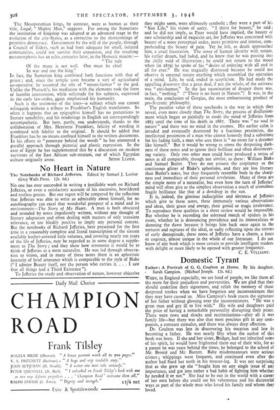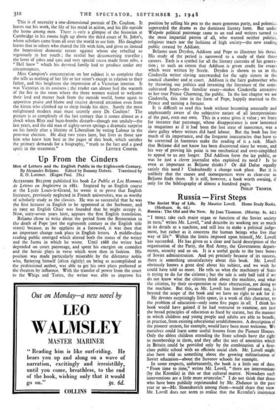Domestic Tyrant
Father : A Portrait of G. G. Coulton at Home. By his daughter, • Sarah Campion. (Michael Joseph. 12s. 6d.)
WHEN, in England especially, we are fond of people, we like them all the more for their prejudices and perversities. We are glad that they should underline their signatures, and relish the memory of those deepened strokes when we have forgotten any inconveniences that they may have caused us. Miss Campion's book traces the signature of her father without glossing over the inconveniences. "He was a great man and gey ill to live with." His wife and daughters paid the price of having a remarkable personality disrupting their peace. There were rows and shocks and recriminations—after all it was family life—but there was also that most precious gift in any com- panion, a constant stimulus, and there was always deep affection.
Dr. Coulton was late in discovering his vocation and late in becoming a father. He was nearly fifty when the author of this book was born. If she and her sister, Bridget, had not inherited some of his spirit, he would have frightened them out of their wits, for as a parent he was years behind the times, he belonged to the school of Mr. Brontë and Mr. Barrett. Baby misdemeanours were serious crimes.; whippings were frequent, and continued even after the author had fixed her teeth in his trouser-leg. It was not surprising that as she grew up she "fought him on any single issue of any importance, and got into rather a bad habit of fighting him whether he needed it or not." She had to be out in the world with a career of her own before she could see his vehemence and his dictatorial ways as part of the whole man who loved his family and whom they loved.
This is of necessity a one-dimensional portrait of Dr. Coulton. It leaves out his work, the life of his mind in action, and his life outside the home among men. There is only a glimpse of the historian at Cambridge in his rooms high up above the third court of St. John's, where scholars came from all over the world to see him. His daughter leaves that to others who shared the life with him, and gives us instead the benevolent domestic tyrant against whom she rebelled so vigorously in her youth ; the zestful but disconcerting traveller ; the lover of jokes and cats and very. special cocoa made from nibs, a "Hell brew" which his devoted, family had to produce under any circumstances.
Miss Campion's concentration on her subject is so complete that she tells us nothing of her life or her sister's except in relation to their father, and this heightens the impression of a Victorian interior. It was Victorian in its cosiness ; the reader can almost feel the warmth of the fire in the room where the three women waited to welcome their lord and master back from the outside world, home again to apportion praise and blame and receive devoted attention even from the kitten who climbed up to sleep inside his shirt. Surely the most enlightened modern man must secretly envy Dr. Coulton! The picture is so completely of the last century that it comes almost as a shock when Blitz and buzz-bombs disturb—though not unduly—the last years, and the old man of eighty-seven springs a dramatic surprise on his family after a lifetime of Liberalism by voting Labour in the post-war election. He died two years later, but lives as those saw him who knew him best in the pages of this book, which satisfies the primary demands for a biography, "truth to the fact and a good



































 Previous page
Previous page